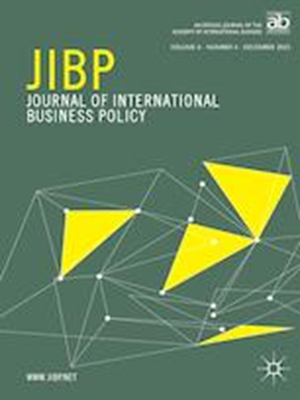The influence of societal nationalist sentiment on trade flows
IF 4.4
Q1 BUSINESS
引用次数: 0
Abstract
Abstract In recent years, the world has witnessed a backlash against globalization and a rise in populist and nationalist movements around the world. However, there appears to be little empirical research concerning how these movements, and especially nationalist sentiment, actually influence trade. Therefore, we explore how and when nationalist sentiment within a country influences trade. Our results indicate that the effect of nationalist sentiment on imports is mediated by lower participation in free trade agreements (FTAs) but not via tariffs. Furthermore, we are unable to confirm support for a direct effect of nationalist sentiment on imports, as predicted by the consumer ethnocentricity literature. However, we do find a strong and negative impact of nationalist sentiment on exports. It would appear that nationalist sentiments tend to blunt the desire to export. Psychic distance between the countries appears to magnify the effects of nationalist sentiment on tariffs and FTAs, but not the direct effects on trade. Finally, we also find that custom union membership, such as the EU, negates the effect of nationalist sentiment on tariffs but this cannot be confirmed for FTAs. Overall, our model enriches our understanding of how nationalist sentiment in society affects trade and offers guidance to policymakers.社会民族主义情绪对贸易流动的影响
近年来,全球出现了反全球化浪潮,民粹主义和民族主义运动在全球范围内兴起。然而,关于这些运动,特别是民族主义情绪如何影响贸易的实证研究似乎很少。因此,我们探讨了一个国家内部的民族主义情绪如何以及何时影响贸易。我们的研究结果表明,民族主义情绪对进口的影响是由较低的自由贸易协定(FTAs)参与介导的,而不是通过关税。此外,正如消费者种族中心主义文献所预测的那样,我们无法证实民族主义情绪对进口的直接影响。然而,我们确实发现民族主义情绪对出口有强烈的负面影响。民族主义情绪似乎会削弱出口的愿望。两国之间的心理距离似乎放大了民族主义情绪对关税和自由贸易协定的影响,但没有放大对贸易的直接影响。最后,我们还发现,关税同盟成员国(如欧盟)否定了民族主义情绪对关税的影响,但这一点在自由贸易协定中无法得到证实。总的来说,我们的模型丰富了我们对社会民族主义情绪如何影响贸易的理解,并为政策制定者提供了指导。
本文章由计算机程序翻译,如有差异,请以英文原文为准。
求助全文
约1分钟内获得全文
求助全文
来源期刊

Journal of International Business Policy
BUSINESS-
CiteScore
10.10
自引率
8.90%
发文量
18
期刊介绍:
The Journal of International Business Policy (JIBP) is a scholarly publication that aims to be the world's leading platform for research on international business policy. It seeks to showcase the best work from scholars in the field of international business and related disciplines. Additionally, the journal provides policy professionals with valuable insights for developing impactful policies.
JIBP is the official publication of the Academy of International Business (AIB), a renowned community of scholars in international business. The journal holds a prestigious status and is currently abstracted and indexed in various databases and platforms, including CNKI, Dimensions, EBSCO Discovery Service, Emerging Sources Citation Index, Google Scholar, Institute of Scientific and Technical Information of China, Naver, Norwegian Register for Scientific Journals and Series, OCLC WorldCat Discovery Service, ProQuest-ExLibris Primo, ProQuest-ExLibris Summon, Research Papers in Economics (RePEc), SCOPUS, and TD Net Discovery Service.
 求助内容:
求助内容: 应助结果提醒方式:
应助结果提醒方式:


